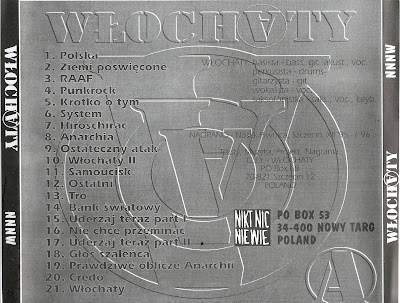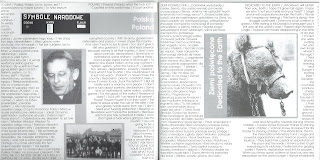If the name FUAL, the Irish band we covered last time, was a little tricky and rather confusing, to pronounce the name Włochaty properly on a first attempt would be akin to a miracle, an event that neither science nor reason could explain. A bit like that bloke who woke up from a coma speaking a highly difficult random foreign language perfectly while he had never even left his hometown in the arse-end-of-nowhere and could barely spell in his mother language to start with. Unless you're Polish or have some knowledge of it. Sometimes I wonder whether Polish punk bands pick names that are hard to pronounce just to take the piss (I know I would).
Włochaty is actually one of the first Polish punk bands I became familiar with in the early 00's, an innocent time when hair loss was still a prospect so distant it was practically unreal and when you could look like a fool without fearing to be the object of a demeaning viral video online. The drummer (who was Polish) and the guitar player of my very first band, a pretty basic French-style punk-rock band with more motivation than talent, were really into Polish punk-rock, a concept that, at a time when I mostly knew English and American bands, sounded about as strange and exotic as polar bear racing ("so they also have punk in Poland! Fuck me!"). I realize now it sounds a little stupid and adorable (alright, mostly stupid I suppose) but I remember vividly the Polish punk tapes my friends played in the guitar player's derelict car. The sound was ghastly as the tapes had been played to death and the tape player was not exactly top-of-the-range (cd players in car were a thing of the upper-class and we loathed them with a passion). On those tapes were Dezerter (obviously) but also Tzn Xenna, Moskwa and many others I cannot remember (those would have almost certainly been classic 80's bands in retrospect). And Włochaty, certainly the band that impressed me the most as they didn't really sound like anything I knew.
As fate would have it, Włochaty toured Europe after this musical encounter (in 2002 or early 2003 I think). A mate of ours was doing a fanzine at the time and he asked us if we could interview the band. So we wrote down some questions (pretty much the usual police interrogation about their influences, politics in Poland, nazis, the local scene and so on) which the drummer translated and we interviewed the band. I have to admit I was pretty proud of myself although I cannot say I did that much. I do remember including a question about how much they loved Conflict and lecturing a helpless friend in the audience about the correct pronunciation of the band's name. I barely knew better than him (after all I had only just talked with the band as some of them spoke English) but I was in a position to pretend I did. Włochaty played a solid gig and that was that. My band split up and I did not really listen to much Włochaty afterwards. They became that kind of good bands that you know you like but don't listen to anymore. A bit like that high school friend who got pissed with you instead of going to P.E. class. A solid dude you would love to see more often but whom you just never call.
When I started thinking about Still Believing in ANOK there were bands that spontaneously came to mind, because they epitomised the survivance of the traditional 80's anarchopunk sound into the 90's and also because some of those bands had been unfairly forgotten (like Capite Damnare or Firing Squad) despite penning some great anarcho songs with their own twist. I instantly thought of Stracony - the Polish Alternative - because they are brilliant and underrated and quite naturally my thoughts drifted towards Włochaty (it actually means "hairy" in Polish) and their magnum opus Wojna Przeciwko Ziemi. I played the album carefully because I only remembered it through younger ears that had not yet been polished and elevated by two additional decades of listening intently, intensely and relentlessly to punk music. And well, you could make the argument that Wojna Przeciwko Ziemi is easily one of the best anarchopunk albums of the 90's.
Such a claim is a matter of perspective too of course because Włochaty were huge in Poland: the tape version of their first album from 1994 sold about 20.000 copies and the band grew into something that no longer belonged to the realms of DIY punk. And let's face it, some of their 00's albums were dreadful and the band did not necessarily take the right turns. So that if you are from Poland, because of this history with which you're obviously familiar because Włochaty is that big famous band, your view of the band is different to that of a punk with a relative knowledge of Polish punk music but oblivious to the status of the band. Because I, the coolest kid in town, am a refined connoisseur of Punk and not just a vowel-challenged nincompoop, I am of course aware of such a discrepancy and therefore I have to do my best to be as objective as possible about Wojna Przeciwko Ziemi. And objectivity dictates that this album must be seen as one of the great anarchopunk works of the 90's along with FUAL, Aus-Rotten's The System Works... for Them, Cress' Monuments or Resist and Exist's Ep's.
Wojna Przeciwko Ziemi's main quality is how monumental, original and epic it sounds, and I mean genuinely formidable, armed with a powerful scope, a coherent meaningful discourse and a sense of narration that is rarely seen in punk-rock. Włochaty were not the heaviest or the most aggressive but the intensity and creativity displayed on their second album is nothing short of awe-inspiring and few anarcho bands can claim to have crafted a work as impressive and convincing as Szczecin's most famous punk export (yeah try to pronounce this while you're at it). There are a lot of great things going on on this Lp so that it would be impossible to list them all. Like any good punk albums (or just albums really) Włochaty's is built like a real story fueled by narrative tools and recurring themes. The use of radio samples reflecting the post-communist Polish society of the 90's, with all it entails in terms of cultural and political changes, throughout the work indicates a cohesive thematic continuity. Likewise the brilliantly epic sax (it pains me to say that I actually enjoy it a lot here) is not overbearing and only operates tastefully at some specific moments to emphasize a mood, increase the pressure or introduce transitions and interludes between songs, keeping in mind that most of the songs are tied with one another through feedback (a trick that Conflict, of course, also used 10 years prior) forming a whole.
The very fast-paced vocal delivery, the maniacal rants and the crazy length of the lyrics are breath-taking at times and can clearly be said to be one of the band's trademarks, it has that intense, almost insane feel that some angry punks are endlessly shouting pamphlets at you (not unlike Dave Trenga from Aus-Rotten and Behind Enemy Lines but with even more words) and the listening experience can be a little exhausting, although I personally love it as it reminds me of a lot of the UK anarcho greats. On a strictly musical level, Włochaty were certainly not a one-trick poney (or rather a one-beat poney) as they experimented with a lot of changes of paces, song structures (there is a proper punk epics on Wojna Przeciwko Ziemi), wrote real transitions and melodies while hitting hard and on the whole displayed a versatile and inspired songwriting ability (yes there is some reggae, get prepared, but also spoken parts and instrumental songs). Conflict's Ungovernable Force - and even Conclusion actually - are by far the band's prevalent influences here, not just in terms of sound but also in terms of structure, form and how it helps shape the music and the message. It has to be noted Włochaty's sometimes complex songs also illustrated a context that was confusing, contradictory and polymorphous. And well, there are also direct loving nods to Conflict as well as Crass (not an easy feat) just to be on the safe side, and Icons of Filth are definitely not far away. The top-drawer riffing, with that inventiveness characteristic of Polish bands, can bring classics like Abaddon or Armia to mind. The band was definitely a 90's band though. I am reminded of what Kochise or Sin Dios were trying to do, not because these bands sounded alike (they did not) but because they built something that was relevant and original at a time when it mattered.
This is a wonderful punk album with a clear production highlighting the musicianship and I keep noticing new details each time I play it, whether it is a bass line, a transition I had not really given much thought to or just a jazzy guitar tune, Wojna Przeciwko Ziemi is a rich work (and it has a song called "Hiroschirac" which always cracks me up). The album has one major flaw: it does not look good. The cover is pretty bland and, if the thick booklet is packed with lyrics (they had a lot to say and those are very long, dense lyrics), it does not really look like anything and is mostly informative. English translations are provided in case you want to know what this is all about (you should). This is the cd version released on Nikt Nic Nie Wie (aka NNNW) the classic Polish label and distros that has been running since 1989. The vinyl version may look better but the cd also includes eight (!) bonus songs that were not included on the tape or vinyl versions. I am not sure where the songs come from, they were not meant to be part of the album-as-story and some are new takes on older songs with a better production but they were probably recorded around the same time, between December, 1995 and January, 1996. For once, I therefore actually recommend you pick the cd version.
Proper anarchopunk epics here.


















No comments:
Post a Comment